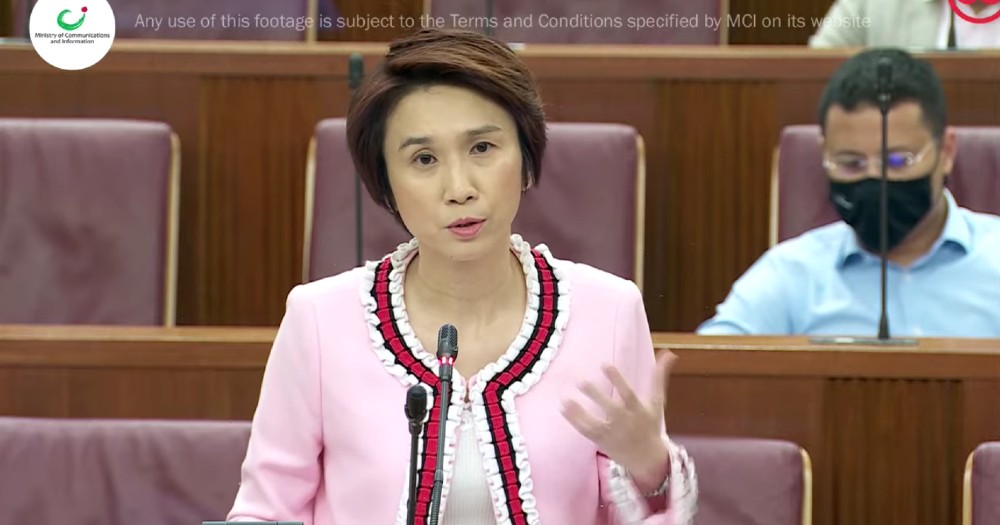Follow us on Telegram for the latest updates: https://t.me/mothershipsg
Minister of State for Trade and Industry Low Yen Ling said in Parliament today (Jan. 11) that core inflation is expected to increase in the first half of 2022, before easing in the later part of the year.
Low said that for the whole of 2022, core inflation is estimated between one to two per cent, likely averaging in the higher end of the forecast.
She was responding to questions from several Members of Parliament (MP) about inflation forecasts for the year and what the government will do to mitigate its impact.
Estimates exclude rental accommodation and private transport costs
Low's use of the Monetary Authority of Singapore's (MAS) Core Inflation rate is, according to her, a "more useful gauge of inflation".
MAS Core Inflation excludes accommodation costs and private road transport costs as "most Singaporeans live in owner-occupied homes and use public transport".
Low said that the MAS Core Inflation rate has been lower than the headline inflation.
She said that MAS Core Inflation has increased from 0.4 per cent year-on-year in the first half of 2021, to 1.1 per cent in the third quarter of 2021, and to 1.6 per cent in November 2021.
This is lower than the headline inflation of 2.5 per cent and 3.8 per cent over the same periods.
Overall inflation to average 1.5-2.5 per cent in 2022
Low said that Singapore's overall consumer price index is projected to average 1.5-2.5 per cent in 2022, following the 2.3 per cent expected for 2021.
Singapore's overall inflation in November 2021 was 3.8 per cent, its highest since February 2013.
Low said that the projected increase in prices are due to "external cost pressures".
These include elevated global energy prices, bottlenecks in global transportation and supply-demand mismatches in various commodities and goods markets.
However, the Ministry of Trade and Industry and MAS expect these rises to be temporary, and pressures to ease gradually over the year.
Low specifically cited global oil prices, which she said are likely to ease as production increases to match demand.
She also said that domestic wage growth is likely to increase as well, as the demand for labour increases together with economic activity.
The Progressive Wage policies, such as the Progressive Wage Model, will also support wages for lower-wage Singaporeans, said Low. As the Covid-19 situation stabilises, Low said that consumer demand should improve.
Strategies to mitigate inflation
Low said:
"The government understands and share the concerns of fellow Singaporeans and businesses and households about the price increases and empathises with the cost pressures felt. While the small and open nature of our economy constrains how much we can shield Singaporeans from inflationary pressures, the government will spare no effort to lessen its impact."
Low shared that the government is "striving hard" to keep Singapore's economy competitive. She shared that despite the the effects of the pandemic, there was real wage growth in 2021, after accounting for inflation.
In 2021, the real median income growth of full-time employed residents was positive, at 1.1 per cent.
Lower-income residents at the bottom 20th percentile saw real incomes rise by a larger 4.6 per cent last year, said Low.
To manage imported and domestic cost pressures, Low shared that MAS tightened its monetary policy last year, which will help reduce the Singapore dollar cost of imports and help shield Singaporeans from some external cost pressures.
She also said that the government has been helping businesses with supply-side constraints through policies like the Wage Credit Scheme and Jobs Support Scheme.
Leon Perera: Does inflation estimates take into account possible GST hike?
In a Supplementary Question, Workers' Party MP Leon Perera asked Low whether the projected increase in inflation in the first half of 2022, and its later easing for the rest of the year, has taken into account a possible increase in the Goods and Services Tax (GST) in the middle of the year.
Low responded by confirming the projection she made earlier, but made no mention of whether this took into account a possible GST hike this year.
She said:
"MAS Core Inflation is expected to increase in the first half of 2022 before easing in the later part of the year. But having said that, we know that we're still in the thick of Covid-19 pandemic, situation is very fluid, it is very volatile. We are a small and open economy and we are exposed to a lot of developments in other parts of the world, including the key food producing countries.
For the full year of MAS Core Inflation, it could average within the upper half of the official forecast range of one per cent to two per cent."
Follow and listen to our podcast here
Top photo via MCI
If you like what you read, follow us on Facebook, Instagram, Twitter and Telegram to get the latest updates.
